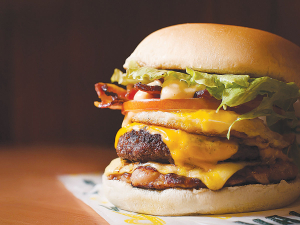Another Windfall for Fonterra Farmers, Unit Holders
Fonterra farmer shareholders and unit holders are in line for another payment in April.
 McDonald's annual shopping list, released this month, shows the fast-food chain used $214m worth of NZ products in its local restaurants.
McDonald's annual shopping list, released this month, shows the fast-food chain used $214m worth of NZ products in its local restaurants.
Fast-food giant McDonalds spent a record $598 million last year on New Zealand milk, cheese, and other primary industry ingredients.
Its annual shopping list, released this month, shows the fast-food chain used $214m worth of NZ products in its local restaurants. A whopping $384 million of produce was exported to other McDonald’s markets. The total spend was $52 million more than in 2021.
Nearly 7 million litres of fresh milk was sourced from dairy farmers – the equivalent of 246 Fonterra milk tankers and enough to fill Kelly Talton’s Stingray Bay aquarium tank 19 times, the company says.
Nearly 2 million kilograms of cheese and other dairy products were used locally, along with 11.6 million kg of cheese exported – the equivalent weight of 6500 empty shipping containers.
The company also used 900,000kg of lettuces and 12 million kg of potatoes in its local restaurants.
McDonalds sources its cheeses from Fonterra’s Eltham site in Taranaki. It says New Zealand farmers are also strategically important suppliers to McDonald’s worldwide. Kiwi produce is exported to McDonald’s markets including Australia, the Pacific Islands, Asia and the United States.
“McDonald’s has long recognised New Zealand as one of its top global suppliers of quality beef and dairy. It’s great to be able to supply a local menu where around 90% of the ingredients are sourced from across Aotearoa, and to share this quality produce with McDonald’s markets around the world,” says managing director NZ and Pacific Islands, Kylie Freeland.
“While we’re a small market in terms of our number of restaurants in the McDonald’s world, New Zealand is amongst the top 10 countries that supply beef to McDonald’s. Globally, we have several commitments around sustainable beef production, and the climate, which means we’re working closely with our local suppliers and industries to help encourage continuous improvement and making a positive impact on the planet.”
Agrisea NZ has appointed Craig Hudson as it's new chief growth officer.
State farmer Landcorp, trading as Pamu, is a forecasting a full-year net profit of around $100 million.
Tony Aitken, chief executive of Ruralco, has been awarded the Excellence in Business Leadership Award at the ANZ Business of the Year Awards.
Global trade has been thrown into another bout of uncertainty following the overnight ruling by US Supreme Court, striking down President Donald Trump's decision to impose additional tariffs on trading partners.
Controls on the movement of fruit and vegetables in the Auckland suburb of Mt Roskill have been lifted.
Fonterra farmer shareholders and unit holders are in line for another payment in April.
OPINION: Staying with politics, with less than nine months to go before the general elections, there’s confusion in the Labour…
OPINION: Winston Peters' tirade against the free trade deal stitched with India may not be all political posturing by the…